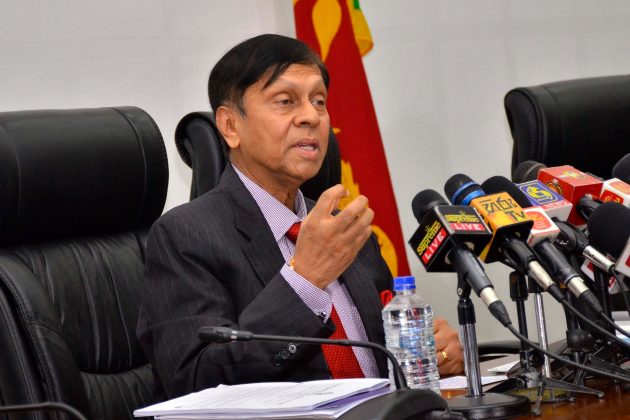To meet the “clamour for capital” the Government will work to develop markets, including venture capital, bond and equity segments, promote better debt management and introduce fresh risk reduction regulations to attract new investors, a top official said yesterday.
Addressing the fifth investor symposium organised by SC Securities Ltd., a fully-owned subsidiary of Sampath Bank PLC, in partnership with Daily FT, State Minister of Money, Capital Market, and State Enterprise Reforms Ajith Nivard Cabraal laid out Government expectations and plans.
“In the next few years we have our work cut out. We have to get our markets right, we have to get new investments to come into Sri Lanka and we have to adjust our debt stock, reduce debt servicing costs and all these things need to be done together. This is the challenge,” he told the packed gathering at Hilton Colombo.
“We have to get our macro fundamentals right. The moment we do this you will see that people do not need invitations to invest. Getting that part right will be another massive responsibility and we will be working on that as well. We also need to get economic growth back on track to reduce the percentage of debt and make debt more manageable.”
Cabraal, who was earlier the Governor of the Central Bank before the change of Government in early 2015, acknowledged that COVID-19 has thrown a curveball at Government plans but insisted that the situation was well in hand to ride out 2020 and return to stronger growth in 2021.
He also insisted that the capacity to claw back foreign investors by improving the business climate existed and would receive due attention, expressing hopes that Sri Lanka could leapfrog up the Ease of Doing Business rankings by the World Bank to reach the 25th position by 2025. Cabraal described this goal as an “awesome challenge” but emphasised such steps were needed to achieve prosperity for all Sri Lankans.
“This is the first time in history that a special function was entrusted to a Minister in relation to capital markets. This is because the Government is very keen to ensure that these markets are buoyant and become robust and we have funds within the country as well as coming from outside to make business work. We have begun to understand how important it is to have capital if we are to progress and grow. We have had different types of capital but we have always had a clamour for capital.”
“Now we are looking at a robust mechanism to take us forward and the Government, particularly the President, has identified the lack of capital as being one of the constraints for development. This is a challenging situation, which has been made more formidable by COVID-19. We have identified several ways capital can flow into Sri Lanka. We need more capital being formed by way of fixed income securities but at the same time Sri Lanka has always had a dearth of equity capital.”
Cabraal said that equity funds will be “nursed” to bring capital into Sri Lanka but in order for this to happen it was important to ensure that Sri Lanka’s capital markets become more robust.
“Nobody goes into a country and invests unless the people of that country are also investing. We have to make sure there is a good playing field to get them to invest here and make it attractive for outsiders. We are also looking at the venture capital market as well.”
“We have had some experience with venture capital in Sri Lanka but I think far too many bankers got into venture capital. This means they look at projects with the banking eye on. I’m sorry to say this but those ventures die even before they can be really up and walking. We need to have a fresh look at venture capital funds. We have to ensure that the Government does not get involved in those and is private sector driven with State support.”
The State Minister recalled that before 2015 the Government bond market at about $ 3.4 billion in foreign investments, which had dropped to about $ 400 million by last year. To reverse this capital flight he acknowledged that the right market conditions had to be created and pledged that there would be an announcement soon to ensure investors are not burdened with the uncertainty of rupee depreciation.
“We have to get our debt right. We will meet all payments, we have done so in the past and we will do so in the future. But at the same time we need to get our debt management right. Debt management is not just about the quantum of debt, it is also about interest rates, the tenor, the composition of currencies in which you are holding debt.
“This is another part of the equation we will be looking at carefully. This is partly why are have reduced interest rates, to make things easier for businesses and Government. We hold some Rs. 7 trillion in securities and just 1% of that is Rs. 70 billion, which buys you about two Colombo-Katunayake expressways.”
Cabraal also pointed out that the Government had to rebalance debt so there was higher rupee debt and a lower percent of foreign currency.
“We should not be deterred by COVID-19. We may not have reforms that the private sector normally expects from Government but we will reform in a way that is proactive. The Ministry allocation showcases a work plan for ministries for the first time. No one in the private sector has acknowledged this but if any of your organisations had done this you would have felt proud. We can measure what is being done and more than that, you can measure us,” he said.
(FT)

